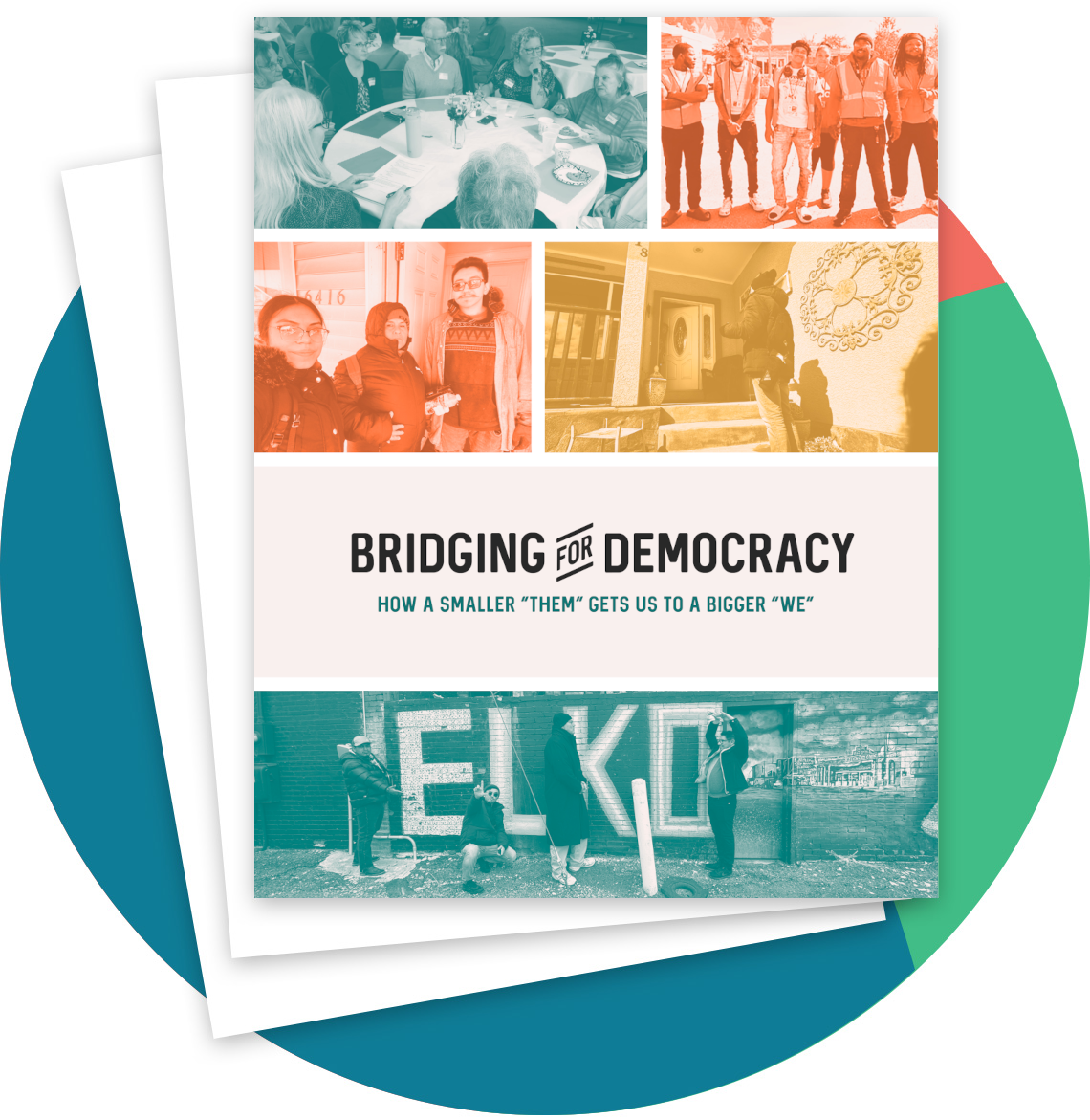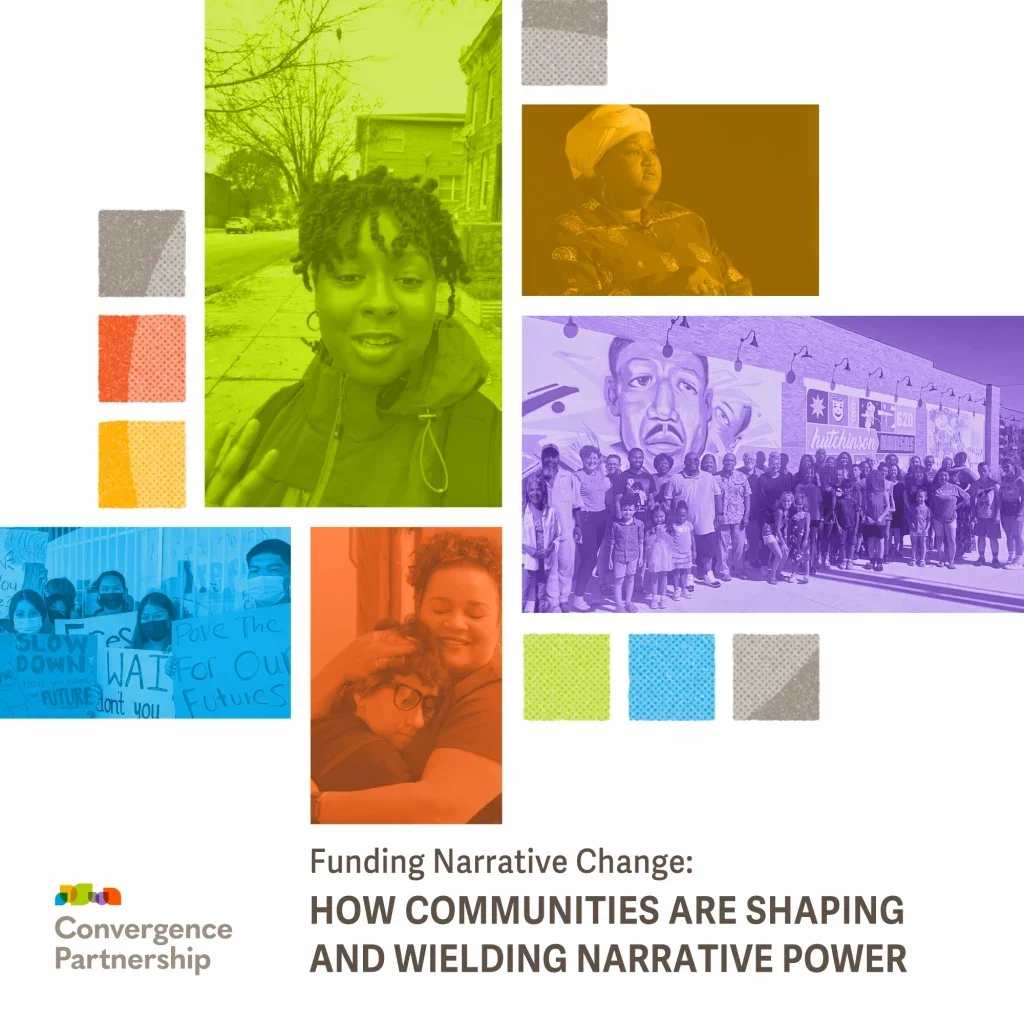
Bridging for Democracy
"Today's growing division and dehumanization cannot just be countered by amassing more forces on one side. We see the act of bridging and listening across differences as critical for the progressive movement to meet this moment."
— Othering and Belonging Institute, UC Berkeley
Measuring Love in the Journey for Justice: A Brown Paper
This paper calls on love as a cure for injustice. It is not a formal research paper. It comes from the heart. It is meant to be used—like love itself. It is meant to start talks and make us think.
Conversation Starters for the Holiday Season
Holiday Conversation Starters
Spark meaningful discussions that honor your values this holiday season. Whether you're hosting a Dinner for Democracy or sitting down with family members who hold different views, these prompts help you connect with intention.
Inclusive America Action Center
"As the largest employer in the world, our federal government cannot afford to have leaders that all look and think the same. I support the Pledge for Diversity campaign because our nation was founded on the principle of unity, not despite our varying backgrounds, but specifically because of it."
— Leon Panetta, Former Secretary of Defense and White House Chief of Staff
Economic Mobility Catalog
A free online resource helping local government leaders identify and implement evidence-based strategies to improve upward economic mobility for their residents.
Over 50 high-level strategies and nearly 200 specific programs backed by rigorous research. From early childhood to workforce development, housing to financial security.
Intro to Systems Thinking: The Iceberg Model
What Is Systems Thinking?
Systems thinking is a way of looking at problems that helps you see the whole picture, not just one piece. Instead of asking "What happened?" it asks "Why did this happen?" and "What patterns am I seeing?"
Think about it this way: When you see a traffic jam, you could just be frustrated about the cars in front of you. Or you could ask deeper questions. Why is there always a traffic jam here at 5pm? What about the road design causes this? What beliefs about how people should get to work led to this road being built this way?
Systems thinking helps us move from quick fixes that don't last to real solutions that change things for good.
2025 State of Housing in Houston.
Why This Matters
For Renters: Rent jumped 9% in one year. Many families must choose between rent and other basic needs.
For Homebuyers: Home prices rose faster than incomes. The typical family can't afford the typical home.
For Communities: Over 500,000 people live in areas threatened by floods, heat, and bad air.
For Policy Makers: Climate and housing problems are connected. Solutions must address both.
For Our Future: Houston is becoming less affordable and less safe to live in.
A $100 Million Bet on Affordable Housing in Dallas
Why This Matters for Dallas
For Community Leaders: A coordinated regional approach to fragmented housing efforts
For Policy Makers: Comprehensive framework addressing policy, production, and preservation
For Developers: Access to capital and innovative construction approaches that reduce costs
For Workers: Focus on "missing middle" and workforce housing for those earning 50-80% AMI
For Dallas' Future: Addressing a projected 76,000 unit shortfall by 2035
Constructive Dialogue Institute Webinar Series
These four webinars from the Constructive Dialogue Institute give college leaders, educators, and student organizers practical tools for building campus cultures where people can talk across differences. Learn from real examples at leading universities.
What This Series Offers
Research-backed strategies from leading universities
Practical tools you can use right away
Real examples from campus dialogue programs
Expert guidance from university leaders
Free recordings you can watch anytime
One Small Step
One Small Step
Let's Talk For A Change
Have a real conversation with someone who sees the world differently than you do. No debates. No arguing. Just two people getting to know each other as human beings.
A StoryCorps initiative bringing together people with different political views for 50-minute conversations that remind us of our shared humanity.
Designing Impactful Campus Speaker Events
Campus speaker events can be flashpoints for division—or opportunities for real learning. This playbook gives organizers practical tools to design events that bring people together across differences, even when discussing tough topics.
What You'll Learn
How to design events that encourage dialogue instead of debates
Ways to set the right tone before, during, and after controversial speakers
Practical steps for choosing speakers who model good conversation
Tools for creating safe spaces where all students can participate
Methods for turning disagreement into learning opportunities
Funding Narrative Change
Who gets to tell the story of your community? For too long, outside voices have shaped narratives about Black and Brown neighborhoods. But a new wave of grassroots organizations is taking back the pen—and the camera, the podcast mic, and the social media account—to tell their own stories and drive real change.
Why This Matters for Organizers
Stories Drive Change: Narrative power is as important as economic or political power
Tools Are Accessible: You do not need Hollywood budgets—TikTok, podcasts, and community theater work
Community Expertise: Those closest to the problems are best positioned to tell the stories
Proven Strategies: Case studies show what works across different communities
Funder Interest: Philanthropy is increasingly supporting narrative change work
Your Guide to State Lawmaking
Want to track a bill? Research how a law came to be? Find out who your state representative is? The Texas Legislative Reference Library gives you free access to all of this and more. It is your window into how state government works.
Why This Resource Matters
Track Legislation: Follow bills from filing to becoming law
Research History: Access bill files dating back to 1907
Understand Process: Learn how the Texas Legislature works
Free for Everyone: No subscription or special access needed
Authoritative Source: Official legislative records and documents
Fresno is building an economy that works for everyone
Three hundred Fresnans came together with a big vision—to build an economy that creates opportunity for everyone. Five years later, the results speak for themselves. Fresno DRIVE shows what is possible when communities lead, when neighbors organize, and when everyone has a seat at the table.
Why This Matters for Organizers
Proof of Concept: Community-led initiatives can move the needle on national rankings
Replicable Model: Multi-billion dollar community-led investment plan created by residents
Infrastructure Focus: Neighborhood Hubs build relationships, trust, and collective power
Long-Term Vision: Five-year timeline shows sustained commitment produces results
Systems Change: Addressing root causes of poverty, not just symptoms
How to Disagree Better? A Guidebook.
"Avoiding difficult conversations won't bring us any closer, but treating others with respect will. Learning to discuss and disagree without being mean is the only way to rebuild our communities."
— Disagree Better Initiative
















